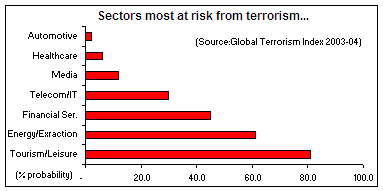Politics of terror!
Source: EM Be it the terror of politics or the politics of terror, we Indians seem to be getting used to both, if one were to go by the spirit of Mumbaikars who are back to their usual self after the devastating blasts that rocked the metropolis' lifeline late yeterday evening. Even the eight blasts across seven different locations in the Western suburban railways have failed to deter the population, which is back to 'where it belongs' - schools, colleges and workplaces. Global terrorism index Rank Country 1 Columbia 2 Israel 3 Pakistan 4 US 5 Phillippines 6 Afghanistan 7 Indonesia 8 Iraq 9 India 10 Sri Lanka/UK
Mumbai, despite all its ills with respect to the crumbling infrastructure situation and a weak administration, still provides a vision of what the rest of India could be in years to come, if (and only if) the modernisation and globalisation initiatives of the government and the private sector continue to make progress. The city is India's financial capital and also the base for its offshore oil industry. It is also the largest contributor to the government's tax revenue and a majority of MNCs prefer to locate their corporate headquarters in the city. In fact, foreign investors see all of India through events that take place in Mumbai.
Even the perpetrators of terrorism are aware of this fact, and if one were to go by some of the chosen places of terrorist activites, things would become clear. Jhaveri bazaar, which is one of India's largest markets for gold, diamonds and gems, and Gateway of India, which is a prominent tourist destination in Mumbai, were made targets in August 2005. More than anything else, the economic significance of these places was seemingly behind the heinous motives of the terrorists. And now the target has been the Mumbai suburban railway, which is the lifeline that connects the entire city, mainly its business destinations.
Terror has its way of affecting the social, geopolitical and economic fabric of the target country. Especially, from an economic standpoint, terrorism, apart from reducing the human and physical 'stock' of a country, also brings about higher levels of uncertainty in the future. Then, terrorism promotes an increase in counter-terrorism expenditures, thus drawing resources from productive sectors for use in sprucing up the security system in the country.
 As far as the economy is directly concerned, terrorism negatively affects certain industries like tourism and leads to heightened apprehension in the foreign investors' community, thus having the potential to reduce their appetite for the target country's assets, especially if the latter belongs to the 'emerging' cadre.
As far as the economy is directly concerned, terrorism negatively affects certain industries like tourism and leads to heightened apprehension in the foreign investors' community, thus having the potential to reduce their appetite for the target country's assets, especially if the latter belongs to the 'emerging' cadre.
'Life must go on', terror or no terror! Mumbaikars have displayed the same this time again. As far as investors are concerned, there might be certain blips on the radar in the short term, especially as foreign investors take stock of the situation. However, the determination and discipline to be part of the long-term India growth story shall pay dividends. And, as the ex-prime minister of the UK, Margaret Thatcher, once exclaimed - "All attempts to destroy democracy by terrorism will fail. It must be business as usual." Amen.
Additional Reports:
- Valueline (July Edition) - Sharekhan